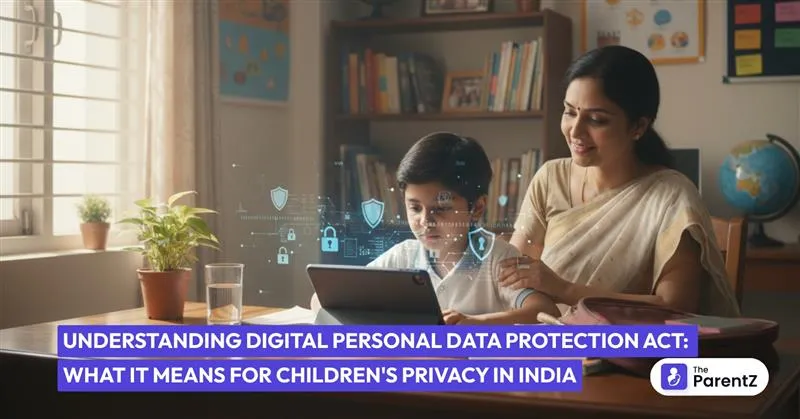As parents, we often post our children’s cute photos online, sign them up for educational apps, or let them browse YouTube Kids. But have you ever thought about what happens to all that data, like their names, photos, school details, or even their voice recordings? With the growth of digital learning and entertainment, children’s personal data is shared more than ever before. And protecting that data is exactly where the Digital Personal Data Protection (DPDP) Act, 2023 comes into play.
What is the DPDP Act, 2023 All About?
The Digital Personal Data Protection Act, 2023, is India’s law that decides how personal data shared online should be collected, stored, and used. In short, it gives citizens, including children, the right to know who is using their data and for what purpose.
Think of it like a privacy rulebook for the internet. It tells companies and websites:
- You must take clear permission before using someone’s data.
- You must tell people exactly what data you’re collecting and why.
- You must delete it when it’s no longer needed.
If they don’t follow these rules, they can face heavy fines, even up to Rs. 200 crore.
Why It Matters for Your Child
Children today are born into a digital world. From online classes to gaming apps, they are constantly sharing bits of information. The DPDP Act recognises children as a vulnerable group who need extra protection. That’s why it brings in special safeguards for users below 18 years of age.
Here’s what that means for us, parents:
- Parental consent is mandatory: Apps, games, or platforms must take your explicit permission before collecting or using your child’s data.
- No targeted ads for kids: Companies cannot use a child’s data to show them personalised advertisements. That means fewer manipulative or addictive promotions.
- No harmful tracking: Platforms have to ensure that the child’s data is not misused or monitored in ways that can harm them emotionally or physically.
So, when your child uses a learning app or an entertainment platform, you have the legal right to know what’s being collected and how it’s used.
What We as Parents Should Watch Out For
Even with laws in place, it’s important for parents to stay alert. Here are key things every parent must do:
- Read privacy policies: Before signing up for an app or website, take a minute to check what kind of permission it asks for. Avoid ones asking for unnecessary data like location or contact lists.
- Use parental controls: Many platforms now provide privacy features. Make sure you switch on privacy settings or child protection modes.
- Avoid oversharing: Posting school names, uniforms, or regular locations can put your child at risk. Be mindful of what you upload on social media.
- Stay informed: Encourage your children to talk if they are asked to share personal details online. Awareness starts at home.
The Rights You and Your Child Have
Under the DPDP Act, you, as a parent or guardian, have certain rights on behalf of your child. You can:
- Ask any digital platform what personal data they have about your child.
- Request correction or deletion of wrong information.
- Withdraw consent at any time if you no longer want that platform to keep or use your child’s data.
This means if your teen created an account years ago, and now you want the data removed, you can legally ask the platform to erase it.
Who Makes Sure These Rules Are Followed?
The law has created a body called the Data Protection Board of India. Think of it as a watchdog that ensures all companies follow the privacy rules. If a company wrongly uses or loses someone’s data, this board can investigate, act, and even impose fines.
So, in case of a privacy breach, say, an app leaks information, you can file a complaint to this board.
Balancing Safety and Convenience
Yes, these rules may mean you’ll have to approve permissions more often or take time to read policies. But they also mean your child’s growing digital footprint stays safer. The DPDP Act may sound like a tough law, but it’s simply a step towards ensuring our children can explore the digital world without fear.
Our job, as parents, is to create that balance, which means allowing them to learn and connect online while keeping their safety first.
Conclusion
The Digital Personal Data Protection Act, 2023 is India’s way of protecting every citizen’s online privacy, especially children’s. With clear rules on consent, accountability, and safety, it makes sure that kids’ personal information is handled responsibly.
Next time your child downloads a new learning app or joins a virtual class, remember: you have the final say over their data. This law is here to back you up, ensuring the digital space your child explores stays safe, secure, and respectful of their privacy.





Be the first one to comment on this story.